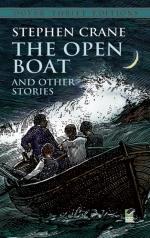|
This section contains 2,356 words (approx. 8 pages at 300 words per page) |

|
SOURCE: Randel, William. “The Cook in ‘The Open Boat’.” American Literature 34, no. 3 (November 1962): 405-11.
In the following essay, Randel investigates discrepancies in the real-life incident that inspired Crane's story “The Open Boat.”
On December 31, 1896, the filibuster Commodore left Jacksonville with a cargo of guns and ammunition for the insurgent army in Cuba. Instead of slipping away surreptitiously, eluding the government cutters that for months had been harassing all ships suspected of filibustering intentions, she set out with official permission, to the considerable bewilderment of Stephen Crane scholars—for Crane's presence aboard, as a seaman at twenty dollars a month, is what gives this particular voyage a continuing interest. Why was the Commodore allowed to sail openly? Later, after the sinking, one survivor said that five men reached safety in a ten-foot dinghy, while all other accounts spoke of four. Which number is correct? And why the discrepancy?
A...
|
This section contains 2,356 words (approx. 8 pages at 300 words per page) |

|


